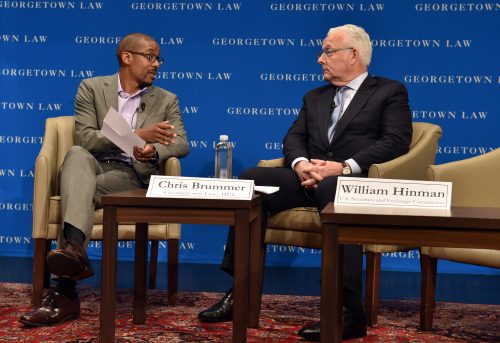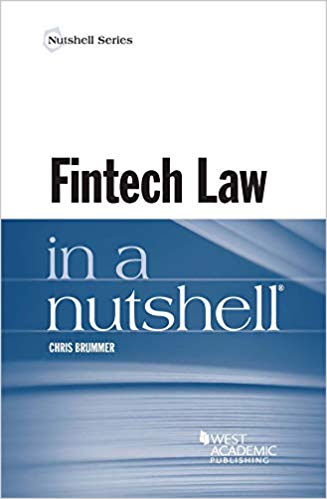Research
Chris Brummer’s research primarily focuses on how international economic law is devised and how it impacts the integrity, safety and soundness of the global financial system. In Professor Brummer’s view, each of the key strands of international law—whether it be international monetary law, trade, financial regulation or tax—often informs one another: How a country conducts its financial regulation, and the intensity of its enforcement rules, will impact how monetary policies devised. Monetary policy can turn impact foreign exchange rates. Foreign exchange rates can in turn impact the robustness of trade rules, which likewise can affect a country’s revenues from tax policy. All the while, economic authorities of all stripes will inform and are informed by the choices and preferences of their domestic and international counterparts. Professor Brummer’s research thus espouses a deeply interdisciplinary vantage point informed by diverse disciplines and methodologies.
Professor Brummer serves as a faculty director from Georgetown University’s Institute of International Economic Law. Founded in 1999 by the late University Professor John H. Jackson, the IEL’s objective is to facilitate thoughtful and scholarly research and teaching, convene stakeholder meetings and conferences bringing together public and private sector leaders, and offer Executive Education across a broad range of subjects that concern the law and the global economy.
Professor Brummer also has a longstanding interest in technology and financial innovation, especially as they impact entrepreneurs and investors. Along with his work in the regulatory community, he has hosted events for entrepreneurs nationally and in Washington, D.C., to better understand the financing needs and business operations of Millenial firms and growing fintech firms.

Fintech Week

Professor Brummer is the founder and organizer of Georgetown’s
annual Fintech Week. During Fintech Week, thought leaders from
fintech firms across the country–from PayPal and Amazon to OnDeck, and from Ripple and R3 to Cloud 9 Technologies and
beyond–describe their business, and explain how their services
intersect with markets for a Washington, DC audience consisting of
policymakers, market participants, academics, lawyers, and
regulators.

Noted Author and Scholar
Professor Brummer is the author or editor of several books. In his first book, Soft Law and the Global Financial System, Professor Brummer draws on a close institutional analysis of the post crisis financial architecture, and argues that despite its reliance on informal guidelines and rules, international financial law is often bolstered by a range of reputational, market, and institutional mechanisms that make it more coercive than classical theories of international law would predict. In his second book, Minilateralism, Professor Brummer shows how the multilateral organizations that dominated the last half of the 20th century no longer monopolize economic affairs. Instead, countries are resorting to more modest many lateral strategies like targeted trade alliances, informal soft law agreements, and financial engineering to manage the global economy. Like traditional moods of economic statecraft, these tools are aimed at both liberalizing and supervising international financial policy in the world of diverse national interests. But unlike before, they are specifically tailored to navigate an at times post- American and post-Western world where economic power is more diffuse than ever before. This book accordingly explains how the strategies work and shows how this new diplomatic toolbox will reshape how countries do business with one another for decades to come.
Professor Brummer has also actively explored the intersections of technology and finance. In the edited volume Cryptoassets: Legal, Regulatory, and Monetary Perspectives, he assembles researchers from around the world to explore the history, use-cases and regulatory paradigms encompassing cryptoassets. He then broadens his lens of analysis in Fintech Law in a Nutshell, and provides an overview of how legal rules and financial regulations are impacting not only cryptoassets, but also fintech more generally. Technology is, as he shows, redefining financial services―including the way actors make and settle payments, raise capital, extend loans, and memorialize increasingly complex relationships. At the same time, new innovations―from cryptocurrencies to marketplace lending, robo-advising, and mobile payments―are creating novel regulatory issues for anti-money laundering requirements and cybersecurity. Brummer’s Nutshell provides a rundown of some the key developments reshaping finance and the rules deployed to oversee them.

Other Notable Works
How International Financial Law Works (and How it Doesn’t), Georgetown Law Review, 2011
Corporate Law Preemption in an Age of Global Capital Markets, Southern California Law Review, 2008
Minilateralism (2014)
Danger of Divergence: Transatlantic Financial Reform & the G20 Agenda (2013)
Post-American Securities Regulation, California Law Review, 2010
Disruptive Technology and Securities Markets, Fordham Law Review, 2015
Soft Law and the Global Financial System: Rule Making in the 21st Century (2015
Stock Exchanges and the New Markets for Securities Laws, University of Chicago Law Review, 2008
Why Soft Law Dominates International Finance—and not Trade, Journal of International Economic Law, 2010
Systemically Important Banks (SIBs) in the Post-Crisis Era: ‘The’ Global Response, and Responses Around the Globe for 135 Countries (with James Barthes, Tong Li and Daniel E. Nolle), 2013
